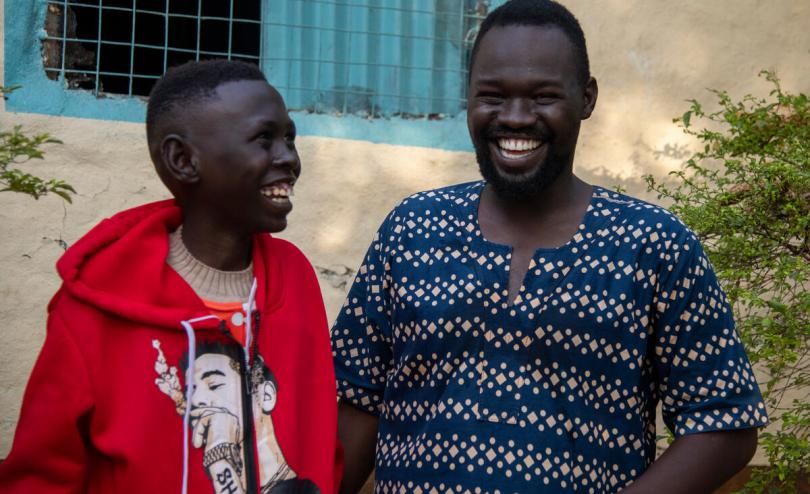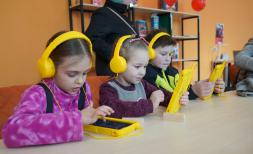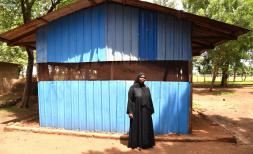South Sudan: Save the Children reunites 7,000th child separated from family by conflict

Simon*, 13, with his brother Samuel* in South Sudan. Save the Children helped reunited the brothers in August 2023. More content available here
Content available here
JUBA, 18 October 2023 – Save the Children and partners in South Sudan have reunited a record 7,000 children with their families, allowing them to restart their lives after being separated by conflict.
The child rights organisation and its partners have been reuniting children with families in the country for nine years, in a large part thanks to a cutting-edge open-source software platform known as the Child Protection Information Management System Plus (CPIMS+). Through use of this software, which includes both a mobile app and offline capabilities, Save the Children staff members recently managed to reunite Simon*, 13, with his adult brother Samuel[CD1] * after three months of separation from family members – bringing the total number of child reunifications the organisation has facilitated in South Sudan since 2017 to 7,000 .
Simon and his family are from Khartoum in neighbouring Sudan, where conflict broke out earlier this year. Simon was staying with his uncle when his neighbourhood was attacked, and when he returned home he found armed groups had taken over the area and neighbours had fled. Scared for his life, he ran away alone, and was identified at the South Sudan border by the International Organisation for Migration (IOM), which referred him to Save the Children. Meanwhile, Simon’s brother Samuel also made his own journey from Khartoum to safety in South Sudan.
Samuel told Save the Children: “When we heard that Simon had left our home in Khartoum and the message reached us people were worried.Anything bad could have happened. Maybe he was kidnapped or was shot or anything so for us as a family here, we were so very worried until when we got the news that he reached Renk and then he was received by some people and they were taking care of him.
“We are very happy to see [our] brother who has been lost and in the beginning, people never knew where he was. Seeing him, we are so honoured and we want to thank all the organisations who are taking care of kids who just flee the war”.
Simon said: “Save the Children gave me hope, hospitality and honoured me, I thanked them (Save the Children) from the bottom of my heart”.
According to CPIMS+ database, nearly 20,000 unaccompanied, separated or missing children have been registered across South Sudan in the past nine years due to conflict within the country and from neighbouring Sudan. Separated and unaccompanied children are more susceptible to violence, abuse and exploitation, which makes returning them to their parents an urgent priority.
Jib Pornpun Rabiltossaporn, Save the Children Country Director in South Sudan, said: “Every time I hear a story like this my heart lifts. Every day we hear more stories of how conflict tears away at children’s lives – and tears them from their families. I could not be more proud of the work of our team in South Sudan, which has now reunited 7,000 children with their families after years of dedicated work.”
In Renk on the border with Sudan, Save the Children works to increase the protection of children and their families who are affected by the Sudan crisis through the provision of child protection services, reunification, referrals and community-based gender-sensitive preventive and responsive interventions.
Save the Children also provides mental health and psychosocial support to children, women and men fleeing the conflict in Sudan. For Simon, Save the Children traced his family whereabouts, reunified him, advocated for his safety, and provided him with basic needs like ‘reintegration kits’ such as clothes, blankets, food, mosquito nets.
About Save the Children in South Sudan
Save the Children has been working in South Sudan since independence in 2011. In 2022, Save the Children reached 2.2 million people in South Sudan including 1.5 million children through its various programmes focused on health, nutrition, education, hygiene, and child protection.
About Save the Children in Sudan
Since conflict broke out in Sudan in April this year, small-arms fire, heavy weaponry, artillery and airstrikes have put thousands of families and children in great danger and caused humanitarian needs across the country to skyrocket to 24.7 million just after the first month of fighting[i].
Save the Children has worked in Sudan since 1983. In 2022, Save the Children directly reached 2.1 million people, including 1.5 million children, with programming focused on child protection, access to quality education, health and nutrition support and responding to emergencies such as the ongoing fighting.
About Family Tracing and Reunification (FTR)
Save the Children, UNICEF and partners work to prevent family separation amid chaos and conflict by informing people how to set up ad-hoc community systems keeping families together. When separation occur, missing children and parents are registered in a national database (CPIMS+) for family tracing which is done by a number of caseworkers across South Sudan. When there is a match, a verification exercise starts to ensure the parents and children are related. After, the actual reunification is initiated. The family also receives support in a transitional period, including food and clothes. The family will also receive follow-up by the caseworker in the months after the reunification to ensure everyone adjust well to the new situation.
*name has been changed to protect anonymity
Content available here
For more information please contact:
Emily Wight (based in London), Emily.Wight@savethechildren.org;
Delfhin Mugo (based in Nairobi), Delfhin.Mugo@savethechildren.org;
Our media out of hours (BST): media@savethechildren.org.uk / +44(0)7831 650409




